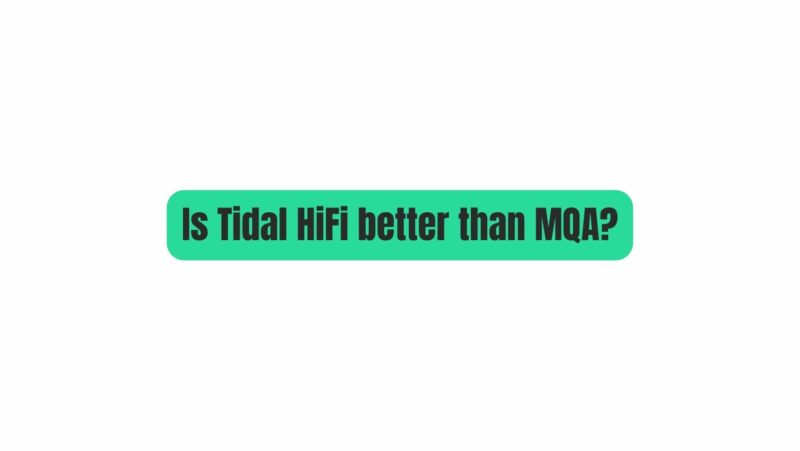In the realm of high-fidelity music streaming, audiophiles are continually searching for the best possible sound quality. Tidal HiFi and MQA (Master Quality Authenticated) have emerged as two prominent contenders in this space. Both promise exceptional audio quality, but they differ in their approaches and offerings. In this article, we will delve into the intricacies of Tidal HiFi and MQA to help you make an informed choice on which one is better suited to your audio needs.
Tidal HiFi: Unveiling the Sound Quality
Tidal HiFi, the high-fidelity streaming service offered by Tidal, has been gaining popularity among music enthusiasts for its promise of delivering lossless audio quality. Here’s a closer look at what Tidal HiFi offers:
- Lossless Audio: Tidal HiFi provides subscribers with access to a vast library of songs in lossless audio format. This means that the music is encoded in a way that preserves every detail of the original recording, offering a superior listening experience.
- Hi-Res Audio: Tidal HiFi goes a step further by offering hi-res audio tracks, which boast even greater detail and clarity than standard CD quality. This is particularly appealing to audiophiles who demand the highest level of audio fidelity.
- Exclusive Content: Tidal is known for its exclusive content, including early releases and special performances. Tidal HiFi subscribers get access to these perks, enhancing their overall music streaming experience.
MQA: A Revolution in Audio Decoding
MQA, on the other hand, is not a streaming service but rather an audio technology developed by Meridian Audio. MQA aims to revolutionize the way we listen to music by delivering studio-quality sound in a compact file size. Here are some key aspects of MQA:
- Master Quality: MQA specializes in encoding music in a way that retains the original studio master quality. This means you can listen to music as the artist and sound engineer intended, with all the subtleties and nuances preserved.
- Efficient Compression: MQA achieves this impressive sound quality without the need for enormous file sizes. This is a significant advantage for those with limited storage space on their devices or slower internet connections.
- Compatibility: MQA is designed to be compatible with a wide range of playback devices, including smartphones, headphones, and home audio systems. This versatility makes it accessible to a broad audience.
Comparing the Two
Now that we have a clear understanding of both Tidal HiFi and MQA, let’s compare them in various aspects:
1. Sound Quality
Tidal HiFi undoubtedly offers exceptional sound quality, especially with its hi-res audio tracks. However, MQA’s promise of studio-quality sound in a smaller file size is equally appealing. The choice between the two ultimately depends on your audio preferences and equipment.
2. Content Library
Tidal HiFi boasts an extensive library of songs, including millions of tracks in lossless and hi-res formats. MQA, on the other hand, does not have its own content library but partners with various music streaming platforms. Therefore, Tidal HiFi might have a slight edge in terms of exclusive content.
3. Cost
The cost of subscribing to Tidal HiFi and accessing MQA-encoded music may vary. Tidal HiFi offers different subscription tiers, while MQA’s cost depends on the partnering streaming service. Consider your budget when making a decision.
4. Device Compatibility
Tidal HiFi and MQA are both designed to be compatible with a range of devices, but it’s essential to ensure that your preferred devices support your chosen format.
5. Convenience
MQA’s efficient file compression makes it more convenient for users with limited storage or slower internet connections. Tidal HiFi, with its larger file sizes, may require more substantial storage and a faster internet connection for seamless streaming.
Conclusion
The question of whether Tidal HiFi is better than MQA does not have a one-size-fits-all answer. Both options offer exceptional sound quality, but they cater to different preferences and priorities. If you prioritize a vast library of lossless and hi-res tracks along with exclusive content, Tidal HiFi might be your preferred choice. However, if you prioritize studio-quality sound in a compact file size, MQA is an attractive option.
Ultimately, the decision comes down to your personal listening habits, equipment, and budget. Whichever you choose, the world of high-fidelity music streaming has never been more accessible, allowing you to enjoy your favorite music in breathtaking detail and clarity.
In the end, the “better” option is subjective and dependent on your individual needs and preferences. Whichever you choose, you can rest assured that both Tidal HiFi and MQA are dedicated to delivering top-notch audio quality to enhance your music listening experience.


